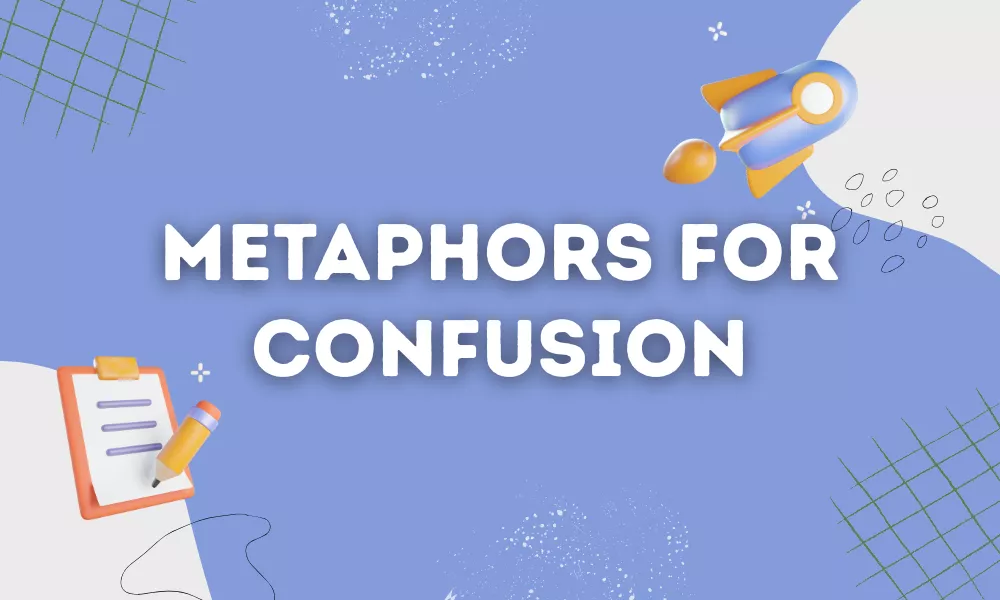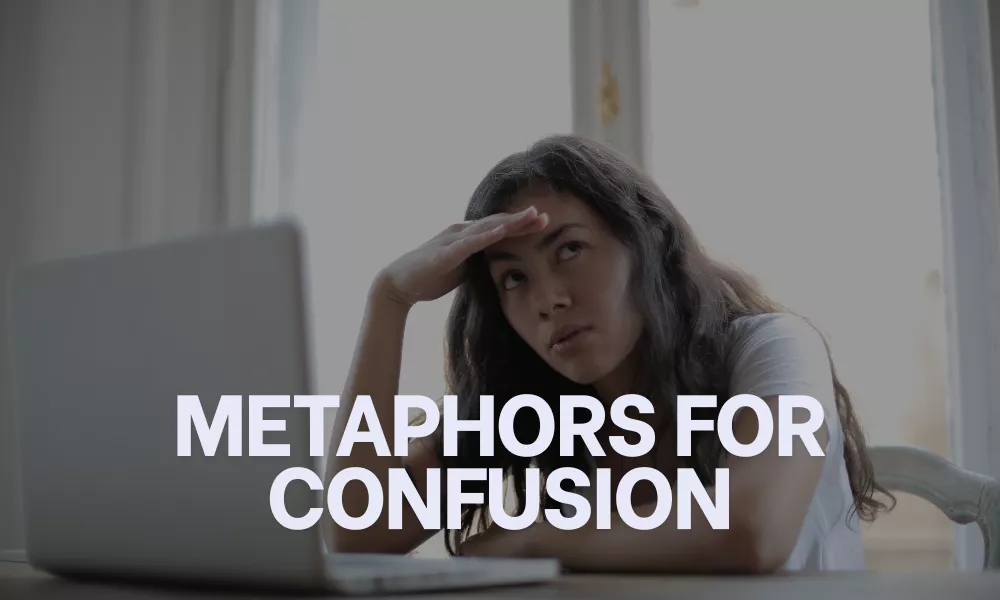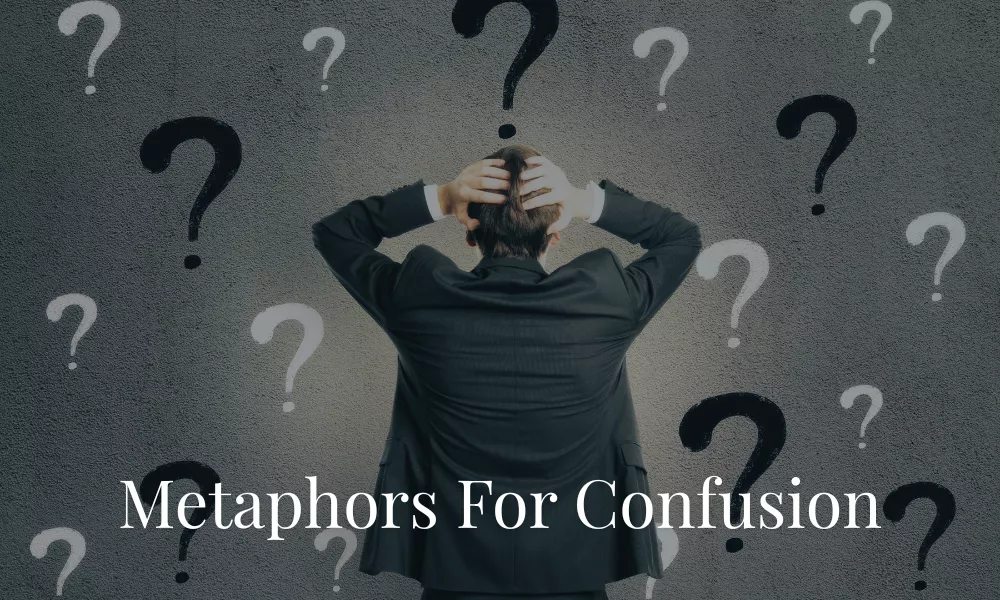Metaphors for Confusion – Vivid Examples to Express Uncertainty

Confusion is like stepping into a fog, everything familiar suddenly feels distant and unclear. It’s a maze of thoughts where each turn seems to lead to more uncertainty, a jumbled puzzle whose missing pieces blur the bigger picture. In such moments, metaphors become our guiding lights, helping us give shape to the shapeless and meaning to the muddled. They transform abstract feelings of bewilderment into vivid images we can understand and relate to.
What Are Metaphors for Confusion?
Metaphors for confusion are creative comparisons that describe the feeling of being mentally lost, uncertain, or overwhelmed. Instead of explaining confusion directly, they use vivid imagery to help us visualize and connect with the experience. These metaphors make abstract emotions more relatable, turning the chaos of confusion into something we can picture, understand, and ultimately navigate toward clarity.

Everyday Metaphors for Confusion
- Confusion is a Fog
Meaning: Everything feels unclear, hard to see or understand.
Example: My mind was in a fog after hearing all those complicated instructions. - Confusion is a Maze
Meaning: It feels like being trapped with no clear direction or way out.
Example: I was stuck in a maze of thoughts trying to decide what to do next. - Confusion is a Tangled Ball of Yarn
Meaning: Thoughts are mixed up and difficult to separate.
Example: His explanation left my mind tangled like a ball of yarn. - Confusion is a Storm in the Mind
Meaning: Many thoughts and emotions are clashing and unsettled.
Example: After the meeting, my head felt like it was caught in a storm. - Confusion is a Cloud Over the Mind
Meaning: It blocks clarity and understanding.
Example: A cloud of confusion hung over me during the exam. - Confusion is a Jigsaw Puzzle with Missing Pieces
Meaning: You can’t see the full picture because something’s missing.
Example: Understanding that theory felt like solving a puzzle with missing pieces. - Confusion is a Traffic Jam in the Brain
Meaning: Thoughts are blocked and can’t move smoothly.
Example: Too much information caused a traffic jam in my mind. - Confusion is a Whirlpool
Meaning: You feel pulled in circles without control or direction.
Example: Her questions dragged me into a whirlpool of confusion. - Confusion is Static on a Radio
Meaning: Communication or understanding is unclear and noisy.
Example: His words sounded like static in my brain, I couldn’t focus. - Confusion is a Broken Compass
Meaning: You don’t know which direction to take.
Example: Without guidance, I felt like I was following a broken compass. - Confusion is a Shadow Over Understanding
Meaning: It hides clarity and makes things uncertain.
Example: Doubt cast a shadow of confusion on my decision. - Confusion is a Spinning Top
Meaning: Everything moves rapidly without control or stability.
Example: My thoughts spun like a top after hearing the news. - Confusion is a Muddled Soup
Meaning: Everything is mixed together and hard to distinguish.
Example: My ideas turned into a muddled soup of uncertainty. - Confusion is a Knotted Rope
Meaning: Things are tangled and hard to untie or understand.
Example: My reasoning became a knotted rope of contradictions. - Confusion is a Blurry Picture
Meaning: Nothing seems sharp or defined.
Example: His explanation left me with a blurry picture of what to do. - Confusion is a Labyrinth
Meaning: A complex and twisting mental path.
Example: I wandered through a labyrinth of choices and doubts. - Confusion is a Torn Map
Meaning: You can’t find your way because the guide is incomplete.
Example: Without clear directions, the plan felt like a torn map. - Confusion is a Stormy Sea
Meaning: You’re tossed around by unpredictable thoughts.
Example: My emotions were like a stormy sea, impossible to calm. - Confusion is a Broken Mirror
Meaning: You can’t see a clear reflection or understanding.
Example: My mind reflected the truth like a broken mirror; distorted and unclear. - Confusion is a Flickering Light
Meaning: Understanding appears and disappears quickly.
Example: Clarity came to me like a flickering light, never steady. - Confusion is a Swirling Vortex
Meaning: Thoughts pull you deeper into uncertainty.
Example: The more I thought, the deeper I fell into a vortex of confusion. - Confusion is a Jungle of Thoughts
Meaning: Everything feels wild and tangled.
Example: My mind was a jungle of ideas fighting for attention. - Confusion is a Puzzle Box
Meaning: It’s tricky to figure out or unlock.
Example: The math problem felt like a puzzle box I couldn’t open. - Confusion is a Storm Cloud
Meaning: It builds tension and uncertainty in your thoughts.
Example: A storm cloud of confusion gathered over my head during the test. - Confusion is a Spinning Carousel
Meaning: You’re going in circles without progress.
Example: The debate turned into a spinning carousel of confusion. - Confusion is a Foggy Road
Meaning: You can’t see the next step clearly.
Example: My future plans feel like driving down a foggy road. - Confusion is a Tidal Wave
Meaning: It overwhelms and sweeps you away.
Example: A tidal wave of confusion hit me during the interview. - Confusion is a Broken Clock
Meaning: Nothing aligns or makes sense in time.
Example: The sequence of events felt like reading a broken clock. - Confusion is a Dust Storm
Meaning: It blurs your mental vision and direction.
Example: My thoughts blew around like dust in a storm. - Confusion is a Crossroad with No Signs
Meaning: You don’t know which path to choose.
Example: I stood at a mental crossroad with no signs to guide me. - Confusion is a Clouded Window
Meaning: You can’t see the truth clearly.
Example: His mixed messages were like looking through a clouded window. - Confusion is a Looping Tape
Meaning: You replay the same uncertain thoughts repeatedly.
Example: My brain kept playing a looping tape of “what ifs.” - Confusion is a Mixed Signal
Meaning: Information is contradictory and unclear.
Example: Her tone gave me mixed signals, leaving me confused. - Confusion is a Torn Page from a Book
Meaning: You’re missing key parts to understand the whole story.
Example: His report felt like reading a torn page from a mystery novel. - Confusion is a Whirlpool of Thoughts
Meaning: You keep getting pulled deeper into uncertainty.
Example: I tried to focus, but my brain was a whirlpool of questions. - Confusion is a Clouded Mirror
Meaning: Self-reflection becomes unclear.
Example: When I doubted myself, my mind felt like a clouded mirror. - Confusion is a Misted Lens
Meaning: Your perspective is blurry and unclear.
Example: Anxiety makes every situation look like a misted lens. - Confusion is a Twisted Path
Meaning: The journey of understanding feels uncertain and curvy.
Example: Trying to understand his motives was a twisted path. - Confusion is a Messy Desk
Meaning: Too many thoughts scattered everywhere.
Example: My mind looked like my desk, completely messy. - Confusion is an Unfinished Painting
Meaning: The full picture hasn’t yet come together.
Example: My understanding of the topic is like an unfinished painting.
Cultural & Literary Metaphors for Confusion
- Confusion is Pandora’s Box
Meaning: Once opened, it leads to chaos and unpredictable outcomes.
Example: Asking about his past opened Pandora’s box of confusion. - Confusion is the Rabbit Hole (Alice in Wonderland)
Meaning: You fall into an endless spiral of strange, puzzling experiences.
Example: Reading conspiracy theories sent me down a rabbit hole of confusion. - Confusion is the Fog of War
Meaning: In chaos, truth and direction become unclear.
Example: In the fog of war, it was hard to tell who was right or wrong. - Confusion is a Labyrinth of Daedalus
Meaning: An intricate and nearly impossible puzzle.
Example: The ancient text was a labyrinth of Daedalus; complex and confusing. - Confusion is the Gordian Knot
Meaning: A problem so tangled that it seems impossible to solve.
Example: The legal case turned into a Gordian knot of confusion. - Confusion is Babel’s Tower
Meaning: A mix of voices and misunderstandings.
Example: The group discussion became a Tower of Babel of confusion. - Confusion is a Siren’s Song
Meaning: It lures you with beauty but leads to chaos.
Example: The offer sounded tempting but was a Siren’s song of confusion. - Confusion is the Labyrinth of Minos
Meaning: A trap designed to confuse and challenge.
Example: My mind felt trapped in the Labyrinth of Minos during the exam. - Confusion is Hamlet’s Dilemma
Meaning: Overthinking and indecision lead to mental unrest.
Example: I was caught in a Hamlet’s dilemma, unable to act due to confusion. - Confusion is the Mists of Avalon
Meaning: A mystical fog that hides truth and understanding.
Example: The mystery remained hidden in the Mists of Avalon of confusion.
Read: Metaphors for Sand
Creative & Modern Metaphors for Confusion
- Confusion is a Computer with Too Many Tabs Open
Meaning: Your brain is overloaded and lagging.
Example: I felt like a computer with too many tabs open during finals week. - Confusion is a Glitched Program
Meaning: Thoughts are misfiring or malfunctioning.
Example: My brain glitched when I tried to understand the new policy. - Confusion is a Buffering Video
Meaning: You’re stuck waiting for clarity to load.
Example: My thoughts were buffering while I tried to process the news. - Confusion is a Crashed App
Meaning: Mental overload causes shutdown or blankness.
Example: When she asked that question, my mind just crashed. - Confusion is an Unreadable QR Code
Meaning: You can’t decode or make sense of the information.
Example: His handwriting was like an unreadable QR code of confusion. - Confusion is a Mixed Playlist on Shuffle
Meaning: Thoughts come randomly and without order.
Example: My ideas played like a shuffle playlist; random and messy. - Confusion is a Lost Signal
Meaning: The connection between understanding and communication breaks.
Example: Halfway through the lecture, my brain lost signal. - Confusion is a Frozen Screen
Meaning: You can’t think or react properly.
Example: When he suddenly confessed, I froze like a screen. - Confusion is a Bug in the System
Meaning: Something small but disruptive makes things go wrong.
Example: A bug in my logic left me confused about the solution. - Confusion is a Spinning Loading Icon
Meaning: Your brain is processing but not reaching clarity.
Example: My thoughts kept spinning like a loading icon during the interview.

Synonyms of Confusion
| Synonym | Meaning |
|---|---|
| Bewilderment | A state of being completely puzzled or perplexed. |
| Perplexity | The condition of being unable to understand or deal with something complex. |
| Disorientation | Loss of sense of direction or clarity about what’s happening. |
| Chaos | Complete disorder and lack of organization. |
| Turmoil | A state of great disturbance, uncertainty, or agitation. |
| Bafflement | A deep sense of surprise and confusion due to something hard to understand. |
| Hesitation | Indecision or pause caused by uncertainty or confusion. |
| Puzzle | A mysterious or confusing situation that requires effort to understand. |
| Disarray | A state of disorder where things are out of place or unclear. |
| Obscurity | The condition of being unclear, hidden, or difficult to comprehend. |
How to Use Confusion Metaphors in Writing & Speaking
- To Create Emotional Depth
Use confusion metaphors in storytelling to express a character’s internal struggle. Example: “Her mind was a foggy forest where every path led nowhere.” - To Simplify Complex Ideas
When explaining difficult topics, use metaphors to make abstract concepts easier to grasp. Example: “Think of your thoughts as tangled wires, you need to separate them to find clarity.” - To Add Imagery and Power in Speeches
Use vivid metaphors to connect emotionally with your audience. Example: “In moments of confusion, we all wander through life’s maze searching for a light.” - To Enhance Poetry or Creative Writing
Metaphors can transform confusion into beauty and art. Example: “My confusion dripped like rain on glass, blurring every reflection.” - To Encourage Self-Reflection
Use metaphors in personal essays or conversations to express growth through confusion. Example: “At first, my thoughts were a storm, but I learned to sail through the chaos.”
Read: Metaphors for Weather
Read: Metaphors for Summer
FAQs
Conclusion
Confusion is a universal human experience, a fog that clouds our thoughts, a maze that tests our patience, or a storm that challenges our clarity. Through metaphors, we give shape and meaning to this abstract feeling, transforming uncertainty into understanding. Whether it’s a tangled web, a broken compass, or a spinning carousel, each metaphor paints a vivid picture of what it means to feel lost. Using metaphors for confusion not only makes writing more expressive but also helps readers emotionally connect with the struggle of finding clarity in chaos.
